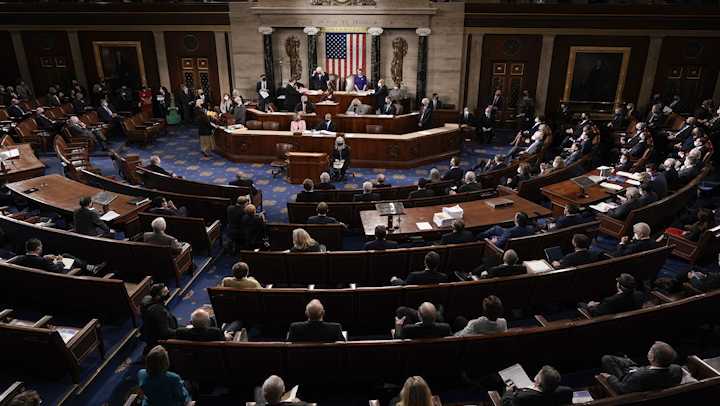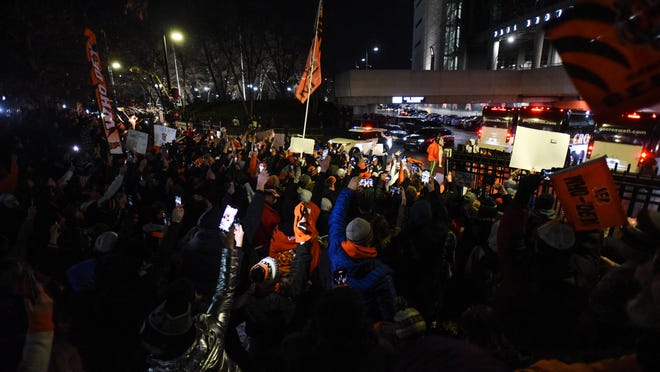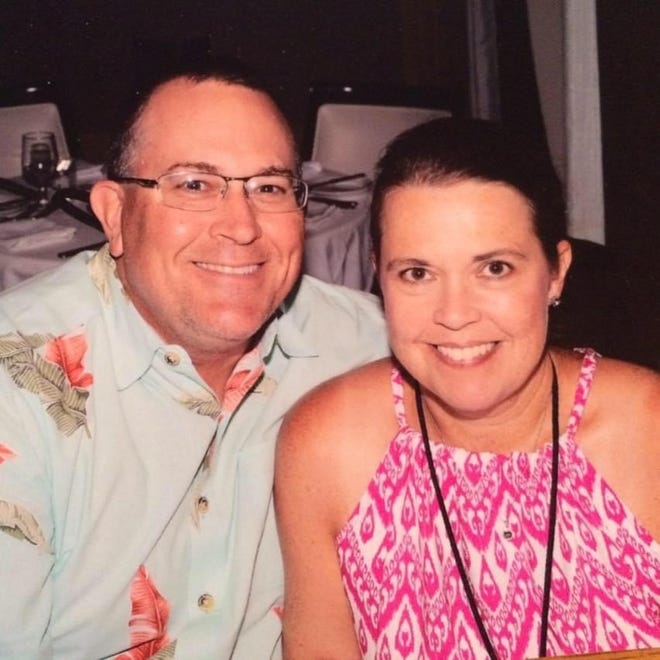

Donald Trump's historic second impeachment trial is opening this week with a sense of urgency — by Democrats who want to hold the former president accountable for the violent U.S. Capitol siege and Republicans who want it over as fast as possible.Scheduled to begin Tuesday, just over a month since the deadly riot, the proceedings are expected to diverge from the lengthy, complicated trial that resulted in Trump's acquittal a year ago on charges that he privately pressured Ukraine to dig up dirt on a Democratic rival, Joe Biden, now the president. This time, Trump's Jan. 6 rally cry to “fight like hell” and the storming of the Capitol played out for the world to see. While Trump very well could be acquitted again, the trial could be over in half the time.Senate leaders reached an agreement Monday, giving the impeachment managers and Trump's lawyers up to 16 hours each to present their cases and creating the option for a debate and vote to call witnesses if the House impeachment managers seek it.Senate Majority Leader Chuck Schumer announced on the Senate floor Monday that the trial rules had been agreed to by Senate Republican and Democrats, as well as the House managers and Trump's legal team. The Senate will vote on the rules on Tuesday, and the trial will kick off with a four-hour debate on the constitutionality of the proceeding followed by a vote."The structure we have agreed to is eminently fair," Schumer said. "It will allow for the trial to achieve its purpose: truth and accountability."Both Trump's lawyers and the House managers exchanged another round of pretrial legal briefs on Monday ahead of the beginning of the trial, in what amounted to a preview of the arguments that senators will hear on the floor in the coming days. The House managers will begin their presentation at noon ET Wednesday, with up to 16 hours to make their case to the Senate. Then Trump's lawyers will have the same amount of time, followed by a session in which senators can ask questions to both legal teams, just like in previous impeachment trials, Schumer said Monday.At the request of the managers, there would be an option to hold a debate and vote on calling witnesses. And at the request of Trump's attorney David Schoen, an observant Jew, there would be no trial proceedings during the Sabbath, after 5 p.m. ET, on Friday through Saturday. Then the trial would reconvene on Sunday afternoon."We are finalizing a resolution that's been agreed to by all parties -- the House managers, the former President's counsel, Leader McConnell and I -- that will ensure a fair, honest, bipartisan Senate impeachment trial of Donald Trump," Schumer said on Monday, adding that if the managers want to call witnesses, "There'll be a vote on that -- that's what they requested."When the trial begins, the House impeachment managers intend to make their case both to the public and the 100 senators who are jurors for the trial that Trump is responsible for last month's deadly riot at the U.S. Capitol. They've been diligently preparing a presentation for when the trial gets underway Tuesday, relying on the hours of video footage available from Jan. 6 to try to illustrate in visceral detail how the rioters were incited by Trump and his months of lies that the election was stolen from him.While convicting Trump with a two-thirds vote is highly unlikely, the case will serve as the first detailed public accounting of how rioters temporarily halted Congress from certifying President Joe Biden's win, violently attacked police officers and actively sought out then-Vice President Mike Pence and House Speaker Nancy Pelosi as they ransacked the Capitol.Trump's legal team plans to argue that Trump did not incite the rioters, and that the trial of a former President is unconstitutional after the House rushed to impeach Trump without giving him the chance to mount any defense. So far, it appears there will be few witnesses called, as the prosecutors and defense attorneys speak directly to senators who have been sworn to deliver “impartial justice” as jurors. Most are also witnesses to the siege, having fled for safety that day as the rioters broke into the Capitol and temporarily halted the electoral count certifying Biden's victory. Defense attorneys for Trump declined a request for him to testify. Holed up at his Mar-a-Lago club, the former president has been silenced on social media by Twitter without public comments since leaving the White House.Instead, House managers prosecuting the case are expected to rely on the trove of videos from the siege, along with Trump's incendiary rhetoric refusing to concede the election, to make their case. His new defense team has said it plans to counter with its own cache of videos of Democratic politicians making fiery speeches.“We have the unusual circumstance where on the very first day of the trial, when those managers walk on the floor of the Senate, there will already be over 100 witnesses present,” said Rep. Adam Schiff, D-Calif., who led Trump's first impeachment. "Whether you need additional witnesses will be a strategic call.”Trump is the first president to be twice impeached, and the only one to face trial after leaving the White House. The Democratic-led House approved a sole charge, “incitement of insurrection,” acting swiftly one week after the riot, the most violent attack on Congress in more than 200 years. Five people died including a woman shot by police inside the building and a police officer who died of injuries the next day.Democrats argue it’s not only about winning conviction, but holding the former president accountable for his actions, even though he’s out of office. For Republicans, the trial will test their political loyalty to Trump and his enduring grip on the GOP.Initially repulsed by the graphic images of the siege, Republican senators including Senate Republican leader Mitch McConnell denounced the violence and pointed a finger of blame at Trump. But in recent weeks GOP senators have rallied around Trump arguing his comments do not make him responsible for the violence. They question the legitimacy of even conducting a trial of someone no longer in office. On Sunday, Republican Sen. Roger Wicker of Mississippi described Trump's impeachment trial as a “meaningless messaging partisan exercise." Republican Sen. Rand Paul of Kentucky called the proceedings a farce with “zero chance of conviction" and described Trump’s language and rally words as “figurative” speech.Senators were sworn in as jurors late last month, shortly after Biden was inaugurated, but the trial proceedings were delayed as Democrats focused on confirming the new president's initial Cabinet picks and Republicans sought to put as much distance as possible from the bloody riot.At the time, Paul forced a vote to set aside the trial as unconstitutional because Trump is no longer in office, drawing 44 other Republicans to his argument.A prominent conservative lawyer, Charles Cooper, rejects that view, writing in a Wall Street Journal opinion piece Sunday that the Constitution permits the Senate to try an ex-official, a significant counterpoint to that of Republican senators who have looked toward acquittal by advancing constitutional claims.Republican Sen. Lindsey Graham of South Carolina, one of Trump’s ardent defenders, said he believes Trump’s actions were wrong and “he’s going to have a place in history for all of this,” but insisted it’s not the Senate’s job to judge.“It’s not a question of how the trial ends, it’s a question of when it ends,” Graham said. “Republicans are going to view this as an unconstitutional exercise, and the only question is, will they call witnesses, how long does the trial take? But the outcome is really not in doubt.”But 45 votes in favor of Paul's measure suggested the near impossibility of reaching a conviction in a Senate where Democrats hold 50 seats but a two-thirds vote — or 67 senators — would be needed to convict Trump. Only five Republican senators joined with Democrats to reject Paul’s motion: Mitt Romney of Utah, Ben Sasse of Nebraska, Susan Collins of Maine, Lisa Murkowski of Alaska and Pat Toomey of Pennsylvania. Schiff was on NBC's “Meet the Press, Wicker spoke on ABC's “This Week,” Paul was on “Fox News Sunday” and Graham was on CBS' “Face the Nation.”___CNN contributed to this report.
Donald Trump's historic second impeachment trial is opening this week with a sense of urgency — by Democrats who want to hold the former president accountable for the violent U.S. Capitol siege and Republicans who want it over as fast as possible.
Scheduled to begin Tuesday, just over a month since the deadly riot, the proceedings are expected to diverge from the lengthy, complicated trial that resulted in Trump's acquittal a year ago on charges that he privately pressured Ukraine to dig up dirt on a Democratic rival, Joe Biden, now the president. This time, Trump's Jan. 6 rally cry to “fight like hell” and the storming of the Capitol played out for the world to see. While Trump very well could be acquitted again, the trial could be over in half the time.
Senate leaders reached an agreement Monday, giving the impeachment managers and Trump's lawyers up to 16 hours each to present their cases and creating the option for a debate and vote to call witnesses if the House impeachment managers seek it.
Senate Majority Leader Chuck Schumer announced on the Senate floor Monday that the trial rules had been agreed to by Senate Republican and Democrats, as well as the House managers and Trump's legal team. The Senate will vote on the rules on Tuesday, and the trial will kick off with a four-hour debate on the constitutionality of the proceeding followed by a vote.
"The structure we have agreed to is eminently fair," Schumer said. "It will allow for the trial to achieve its purpose: truth and accountability."
Both Trump's lawyers and the House managers exchanged another round of pretrial legal briefs on Monday ahead of the beginning of the trial, in what amounted to a preview of the arguments that senators will hear on the floor in the coming days.
The House managers will begin their presentation at noon ET Wednesday, with up to 16 hours to make their case to the Senate. Then Trump's lawyers will have the same amount of time, followed by a session in which senators can ask questions to both legal teams, just like in previous impeachment trials, Schumer said Monday.
At the request of the managers, there would be an option to hold a debate and vote on calling witnesses. And at the request of Trump's attorney David Schoen, an observant Jew, there would be no trial proceedings during the Sabbath, after 5 p.m. ET, on Friday through Saturday. Then the trial would reconvene on Sunday afternoon.
"We are finalizing a resolution that's been agreed to by all parties -- the House managers, the former President's counsel, Leader McConnell and I -- that will ensure a fair, honest, bipartisan Senate impeachment trial of Donald Trump," Schumer said on Monday, adding that if the managers want to call witnesses, "There'll be a vote on that -- that's what they requested."
When the trial begins, the House impeachment managers intend to make their case both to the public and the 100 senators who are jurors for the trial that Trump is responsible for last month's deadly riot at the U.S. Capitol. They've been diligently preparing a presentation for when the trial gets underway Tuesday, relying on the hours of video footage available from Jan. 6 to try to illustrate in visceral detail how the rioters were incited by Trump and his months of lies that the election was stolen from him.
While convicting Trump with a two-thirds vote is highly unlikely, the case will serve as the first detailed public accounting of how rioters temporarily halted Congress from certifying President Joe Biden's win, violently attacked police officers and actively sought out then-Vice President Mike Pence and House Speaker Nancy Pelosi as they ransacked the Capitol.
Trump's legal team plans to argue that Trump did not incite the rioters, and that the trial of a former President is unconstitutional after the House rushed to impeach Trump without giving him the chance to mount any defense.
So far, it appears there will be few witnesses called, as the prosecutors and defense attorneys speak directly to senators who have been sworn to deliver “impartial justice” as jurors. Most are also witnesses to the siege, having fled for safety that day as the rioters broke into the Capitol and temporarily halted the electoral count certifying Biden's victory.
Defense attorneys for Trump declined a request for him to testify. Holed up at his Mar-a-Lago club, the former president has been silenced on social media by Twitter without public comments since leaving the White House.
Instead, House managers prosecuting the case are expected to rely on the trove of videos from the siege, along with Trump's incendiary rhetoric refusing to concede the election, to make their case. His new defense team has said it plans to counter with its own cache of videos of Democratic politicians making fiery speeches.
“We have the unusual circumstance where on the very first day of the trial, when those managers walk on the floor of the Senate, there will already be over 100 witnesses present,” said Rep. Adam Schiff, D-Calif., who led Trump's first impeachment. "Whether you need additional witnesses will be a strategic call.”
Trump is the first president to be twice impeached, and the only one to face trial after leaving the White House. The Democratic-led House approved a sole charge, “incitement of insurrection,” acting swiftly one week after the riot, the most violent attack on Congress in more than 200 years. Five people died including a woman shot by police inside the building and a police officer who died of injuries the next day.
Democrats argue it’s not only about winning conviction, but holding the former president accountable for his actions, even though he’s out of office. For Republicans, the trial will test their political loyalty to Trump and his enduring grip on the GOP.
Initially repulsed by the graphic images of the siege, Republican senators including Senate Republican leader Mitch McConnell denounced the violence and pointed a finger of blame at Trump. But in recent weeks GOP senators have rallied around Trump arguing his comments do not make him responsible for the violence. They question the legitimacy of even conducting a trial of someone no longer in office.
On Sunday, Republican Sen. Roger Wicker of Mississippi described Trump's impeachment trial as a “meaningless messaging partisan exercise." Republican Sen. Rand Paul of Kentucky called the proceedings a farce with “zero chance of conviction" and described Trump’s language and rally words as “figurative” speech.
Senators were sworn in as jurors late last month, shortly after Biden was inaugurated, but the trial proceedings were delayed as Democrats focused on confirming the new president's initial Cabinet picks and Republicans sought to put as much distance as possible from the bloody riot.
At the time, Paul forced a vote to set aside the trial as unconstitutional because Trump is no longer in office, drawing 44 other Republicans to his argument.
A prominent conservative lawyer, Charles Cooper, rejects that view, writing in a Wall Street Journal opinion piece Sunday that the Constitution permits the Senate to try an ex-official, a significant counterpoint to that of Republican senators who have looked toward acquittal by advancing constitutional claims.
Republican Sen. Lindsey Graham of South Carolina, one of Trump’s ardent defenders, said he believes Trump’s actions were wrong and “he’s going to have a place in history for all of this,” but insisted it’s not the Senate’s job to judge.
“It’s not a question of how the trial ends, it’s a question of when it ends,” Graham said. “Republicans are going to view this as an unconstitutional exercise, and the only question is, will they call witnesses, how long does the trial take? But the outcome is really not in doubt.”
But 45 votes in favor of Paul's measure suggested the near impossibility of reaching a conviction in a Senate where Democrats hold 50 seats but a two-thirds vote — or 67 senators — would be needed to convict Trump. Only five Republican senators joined with Democrats to reject Paul’s motion: Mitt Romney of Utah, Ben Sasse of Nebraska, Susan Collins of Maine, Lisa Murkowski of Alaska and Pat Toomey of Pennsylvania.
Schiff was on NBC's “Meet the Press, Wicker spoke on ABC's “This Week,” Paul was on “Fox News Sunday” and Graham was on CBS' “Face the Nation.”
___
CNN contributed to this report.
Source link









